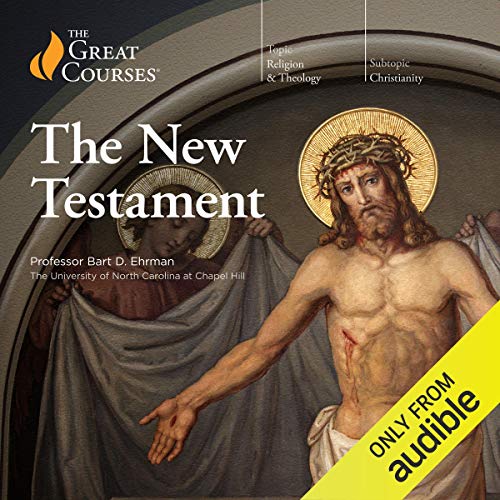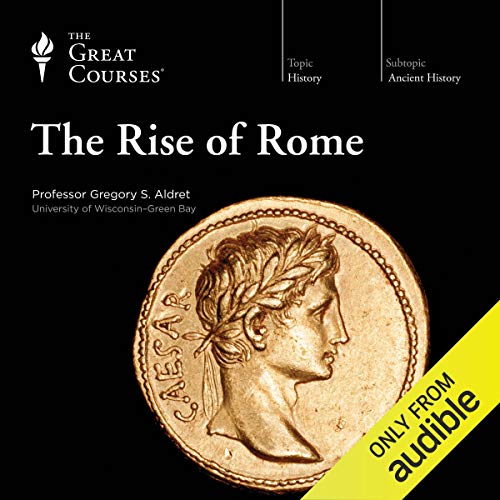 Your audiobook is waiting!
Your audiobook is waiting!
Enjoy a free trial on us
$0.00$0.00
- One credit a month to pick any title from our entire premium selection to keep (you’ll use your first credit now).
- Unlimited listening on select audiobooks, Audible Originals, and podcasts.
- You will get an email reminder before your trial ends.
- $14.95$14.95 a month after 30 days. Cancel online anytime.
One-time purchase:
-12% $36.71$36.71
 Preview
Preview Foundations of Eastern Civilization
 Audible Audiobook
– Original recording
Audible Audiobook
– Original recording
China. Korea. Japan. Southeast Asia. How did Eastern civilization develop? What do we know about the history, politics, governments, art, science, and technology of these countries? And how does the story of Eastern civilization play out in today's world of business, politics, and international exchange?
Over the course of 48 ambitious lectures, take a grand journey through Eastern civilization to study everything from the material economy of day-to-day life to the political and religious philosophies that would bind these cultures together for thousands of years. While China is home to some of the great moments in world history and a major focal point for this course, you'll also take several extended forays into Central and Southeast Asia to build a comprehensive picture of Eastern civilization.
"To truly understand the modern world, it is essential to know something about the many extraordinary contributions Eastern civilization has made," Professor Benjamin says. "Simply put, it is not enough to know just the 'Western' half of the story any more-both Eastern and Western are critical to understanding our present and our future."
Now is your chance to fill in the other half of the story. You may be surprised to realize that all of us have been students of Eastern civilization, even if we have not been aware of it. Filled with captivating stories and surprising details, this course will open up an entirely new world for you as it unfolds the story of Eastern civilization.
- Listening Length23 hours and 22 minutes
- Audible release dateOctober 23, 2013
- LanguageEnglish
- ASINB00FX6CB1W
- VersionOriginal recording
- Program TypeAudiobook
People who viewed this also viewed
- Audible Audiobook
- Audible Audiobook
- Audible Audiobook
- Audible Audiobook
- Audible Audiobook
People who bought this also bought
- Audible Audiobook
- Audible Audiobook
- Audible Audiobook
- Audible Audiobook
- Audible Audiobook
Product details
| Listening Length | 23 hours and 22 minutes |
|---|---|
| Author | Craig G. Benjamin, The Great Courses |
| Narrator | Craig G. Benjamin |
| Audible.com Release Date | October 23, 2013 |
| Publisher | The Great Courses |
| Program Type | Audiobook |
| Version | Original recording |
| Language | English |
| ASIN | B00FX6CB1W |
| Best Sellers Rank | #48,232 in Audible Books & Originals (See Top 100 in Audible Books & Originals) #340 in World History (Audible Books & Originals) #2,710 in World History (Books) |
Customer reviews
- 5 star4 star3 star2 star1 star5 star26%0%74%0%0%26%
- 5 star4 star3 star2 star1 star4 star26%0%74%0%0%0%
- 5 star4 star3 star2 star1 star3 star26%0%74%0%0%74%
- 5 star4 star3 star2 star1 star2 star26%0%74%0%0%0%
- 5 star4 star3 star2 star1 star1 star26%0%74%0%0%0%
Customer Reviews, including Product Star Ratings help customers to learn more about the product and decide whether it is the right product for them.
To calculate the overall star rating and percentage breakdown by star, we don’t use a simple average. Instead, our system considers things like how recent a review is and if the reviewer bought the item on Amazon. It also analyzed reviews to verify trustworthiness.
Learn more how customers reviews work on AmazonTop reviews from the United States
There was a problem filtering reviews. Please reload the page.
- Reviewed in the United States on February 19, 2021As other reviews have noted, this is _not_ a unified history of Eastern Civilization (which I hope the Great Courses will produce some day), it’s a history of China, with mini-series on Korea and Japan interspersed. For instance, the Chinese conquest of Korea is barely mentioned in the main series on China, so it comes as something of a shock in the Korea series of lectures. All three series are, as others have noted, good sound Great Courses lectures, so I do recommend listening to them, at least until the Great Courses releases a unified history.
I do, of course, have some minor complaints. As usual, the course guide lacks a map of the localities mentioned. Professor Benjamin seems to have troubles when he strays further from China, e.g. his claim that China (rather than Lydia) invented coinage (14 9:37), and his remarks on Gilgamesh. He should have explained the difficulties before assuming understanding of the Communist’s Pinyin transcription system and its pronunciation, rather than putting it off until forced to by the Tao/Dao non-distinction. (My rather biased suggestion would be to mention that the Yale system almost makes sense to readers of English, and Pinyin is most easily understood as an inconveniently radical shortening of it.)
Professor Benjamin is usually quite good at keeping current obligatory academic opinions out of the lectures, though there are some slips which are already looking unfortunate: His undue sympathy for the Communist dynasty in North Korea at the end of lecture 42; the unfortunate transition from China supposedly freeing itself from imperial domination in lecture 45, immediately followed by his acknowledgment of domination by the Soviet empire; his claim that Xi seemed certain to continue government by the party (rather than a personality cult) at 47 22:59; his refusal to define “civilization” meaningfully due to the taboo that all judgement is evil, at 48 9:49 (If he actually meant what he said, it was presumably reprehensible for me to listen to his 48-lecture course on Eastern Civilization before the inexcusably shorter series on the Celtic World [not “Civilization”].); his use of “authoritarian” when, if he actually intended the distinction, he surely meant “totalitarian” (48 20). And finally, some linguistic nits: His uses of “frankly” and “succinctly” are usually superfluous and often incorrect; his four uses of ‘literally” in the Guide text are correct though superfluous, but he uses it incorrectly in lecture 38 at about 19 minutes.
- Reviewed in the United States on October 10, 2015From the way Prof Benjamin defines his subject to almost everything in the series, the information is contextualized. And the contextualization is largely based on their present relevancy. Let me elaborate.
A lot of courses go through events chronologically. To a degree, this course may also appear similar. But Professor Benjamin is not interested in an encyclopedic recital of history - kings and their men who came and went along with the jotting down of key wars, court intrigues, cultural trends etc.
The book has a theme and so have all the major sections in their own unique way. These themes are clearly defined right at the beginning and then repeated at the end with all the details repeatedly punctuated for their connections with the theme under discussion at that point. One rarely begins to wonder why one is learning all the stuff.
And the series will not disappoint those only seeking information. In fact, the lecture series appears to move too fast at every stage given how much it has taken upon itself. The 19th and the 20th century events appear particularly ill-treated: the Taiping and the Boxer revolutions, the Meiji restorations, Pearl Harbor, Japan's Asian occupations, Mao and Ho Chin Min eras, the Korean wars etc should have got at least somewhat more space or alternatively, the foundation could have stopped with some point in the 19th century. Despite the promises at various points, the author skips most of SE Asia ex Vietnam, avoids Tibet/Taiwan and the Stans while nearly ignores India. In other words, the Professor appears constrained by the time allocated by the Course's designer.
Yet, a must listen.
- Reviewed in the United States on October 11, 2015I can't speak to the Chinese or Korean aspects, but I don't like his treatment of the Japanese portions. There are some glaring errors that make me unsure how much to trust the portions I'm less familiar with. For example - when referencing the Satsuma Rebellion (1877) he TWICE refers listeners to the movie The Last Samurai for more information on the events. Now, I understand how much material has to be cut in order to cover so much history, but at LEAST include the tiny caveat that "oh, the movie covers the Satsuma Rebellion, but the 'last samurai' was Japanese (Saigo Takamori), not American." Or else just don't even mention the movie (the better option), but don't refer listeners to such an inaccurate movie as an extension of your own materials. This guy seems to know China, but I wish he'd just stuck to that instead of attempting to cover other portions of Asia, too.
Oh, and his Japanese pronunciation is absolutely horrendous. Every movie I've seen that attempts to pronounce Japanese names or places does a better job - ninja turtles, anime, Jackie Chan movies... and this guy is supposed to be the scholar? I couldn't stop cringing.
















